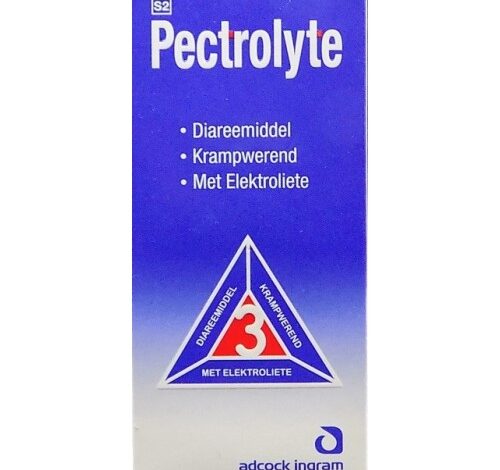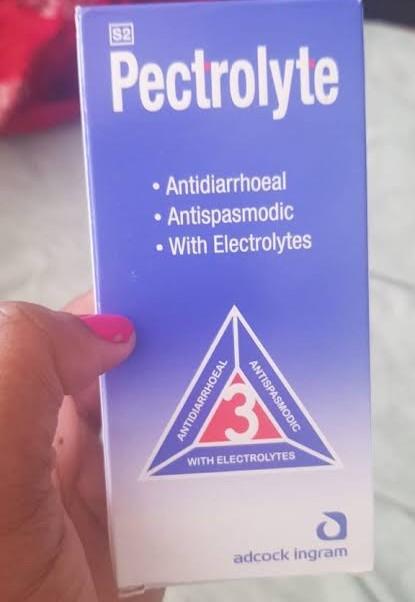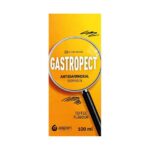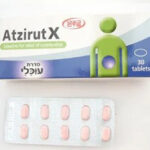Pectrolyte: Ingredients, Uses, Dosage, Side Effects

What is Pectrolyte used for?
Pectrolyte is a medicine that has been used for many years to treat diarrhoea in children and adults. Pectrolyte Suspension works by absorbing excess fluid and reducing intestinal movement; binding substances in the intestine and adding bulk to the stools; works for nerve conduction, muscle contraction, kidney function and heart beating; increasing the blood volume; possessing the sodium chloride content; neutralizing the lactic acid present in the body. Adcock Ingram manufactures Pectrolyte Suspension.
Pectrolyte Suspension is composed of the following active ingredients (salts);
- Chlorodyne – 2Ml/100Ml
- Kaolin – 20Ml
- Pectin – 0.4Ml
- Potassium Chloride – 0.14Ml
- Sodium Chloride – 0.26Ml
- Sodium Lactate – 0.29Ml

How should I take Pectrolyte Suspension?
Do not use Pectrolyte Suspension to treat your diarrhea if you have a fever or if there is blood or mucus in your stools. Contact your doctor.
Take Pectrolyte Suspension, following the directions in the product package, after each loose bowel movement until the diarrhea is controlled, unless otherwise directed by your doctor.
Importance of diet and fluid intake while treating diarrhea:
- In addition to using medicine for diarrhea, it is very important that you replace the fluid lost by the body and follow a proper diet. For the first 24 hours, you should eat gelatin and drink plenty of clear liquids, such as ginger ale, decaffeinated cola, decaffeinated tea, and broth. During the next 24 hours you may eat bland foods, such as cooked cereals, bread, crackers, and applesauce. Fruits, vegetables, fried or spicy foods, bran, candy, and caffeine and alcoholic beverages may make the condition worse.
- If too much fluid has been lost by the body due to the diarrhea, a serious condition may develop. Check with your doctor as soon as possible if any of the following signs or symptoms of too much fluid loss occur:
- Decreased urination
- Dizziness and lightheadedness
- Dryness of mouth
- Increased thirst
- Wrinkled skin
The dose of Pectrolyte Suspension will be different for different patients. Follow your doctor’s orders or the directions on the label. The following information includes only the average doses of kaolin and pectin. If your dose is different, do not change it unless your doctor tells you to do so.
The amount of medicine that you take depends on the strength of the medicine. Also, the number of doses you take each day, the time allowed between doses, and the length of time you take the medicine depend on the medical problem for which you are using the medicine.
- For diarrhea:
- For oral dosage form (suspension):
- Adults—The usual dose is 4 to 8 tablespoonfuls (60 to 120 milliliters [mL]) taken after each loose bowel movement.
- Children 12 years of age and over—The usual dose is 3 to 4 tablespoonfuls (45 to 60 mL) taken after each loose bowel movement.
- Children 6 to 12 years of age—The usual dose is 2 to 4 tablespoonfuls (30 to 60 mL) taken after each loose bowel movement.
- Children 3 to 6 years of age—The usual dose is 1 to 2 tablespoonfuls (15 to 30 mL) taken after each loose bowel movement.
- Children up to 3 years of age—Use and dose must be determined by your doctor
- For oral dosage form (suspension):
What are the side effects of Pectrolyte Suspension?
The following is a list of possible side-effects that may occur from all constituting ingredients of Pectrolyte Suspension. This is not a comprehensive list. These side-effects are possible, but do not always occur. Some of the side-effects may be rare but serious.
Consult your doctor if you observe any of the following side-effects, especially if they do not go away.
- Bloating
- Pneumoconiosis
- Diarrhoea
- Decrease in appetite
- Mineral depletion
- Stomach pain or swelling
- Pectrolyte Suspension may also cause side-effects not listed here.
Note: Kaolin has been used for years in combination with pectin for diarrhea. However in April 2003, the U.S. Food and Drug Administration (FDA) found that there wasn’t enough scientific support for kaolin’s use in treating diarrhea. Since April 2004, drug manufacturers have not been allowed to put kaolin in diarrhea medicine. As a result, such products In the U.S. no longer contain kaolin.





